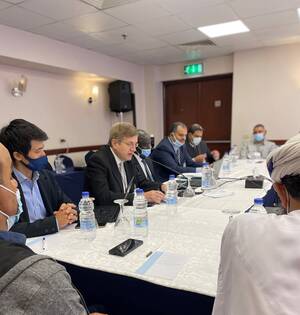Training on modern protected agricultural practices for the Arabian Peninsula partner countries

This workshop is part of the Arabian Peninsula Regional Program funded by the Arab Fund for Economic and Social Development (AFESD) and the Kuwait Fund for Arab Economic Development (KFAED).
ICARDA and the Central Laboratory for Agriculture Climate of the Agriculture Research Center in Egypt (ARC) jointly organized a five-day workshop on modern horticulture practices for the Arabian Peninsula partner countries. The workshop took place in Cairo, Egypt, from the 11th until the 16th of December. Several experts and researchers from ICARDA and ARC took part in the workshop, and researchers and extension agents from five of the six Gulf Council of countries members and Yemen.

Agriculture and food production is a challenge in the desert farming dominant regions such as the Arabian Peninsula due to the harsh climate conditions, freshwater scarcity, and poor soil quality. So, ICARDA and national partners introduced modern agricultural practices to strengthen the resilience of farmers in the region through the Arabian Peninsula Regional Program (APRP).
The program promoted Protected Agriculture (PA) practices – the use of technology to alter the environment around crops – such as greenhouses and hydroponics (soilless planting) as part of the package. These modern practices substantially reduce water usage and provide a better and higher yield. Techniques like insect-proof covers (net house) for ventilation, double doors for greenhouses, and crop density control used for the soilless production system are all solutions to water scarcity and low soil fertility.
The project also offers the Integrated Production and Protection Management (IPPM) innovation as a foundation for reducing hazardous chemicals at greenhouses. In IPPM, mechanical, cultural, biological control, biopesticides application combined with new water and energy-saving technologies would considerably reduce dangerous chemicals and increase productivity to the highest sustainable levels.
During the workshop, the trainees learned multiple several PA methods to manage their crops such as:
- Water and fertilizer requirements for vegetable crops
- Computerized fertigation systems and irrigation system design
- Hydroponic production systems for vegetables in greenhouses
- Design, installation, and management of greenhouses
- Artificial intelligence and digital control systems in greenhouses
- Modern technologies in the management of vegetable nurseries
- Integrated pest and disease management in vegetable production under controlled environments
"With the intensifying climate change conditions, and especially in water-deficient areas where traditional cropping is not viable, greenhouses have allowed farmers to grow crops on small plots sustainably with increased yields and less water waste." – Dr. Muthir Saleh Said Al-Rawahy, Head of the Agriculture Department, Ministry of Agriculture and Fisheries, Sultanate of Oman
High-quality products require high-quality management throughout the controlled environment production, post-harvest and commercialization, and consumption value chain. Capacity building in IPPM and PA systems would significantly improve high-quality crops' water and land productivity.
"Our role as researchers is to participate in fruitful workshops and technical conversations to be able to inform better and support policymakers. Then, we can take the Protected Agriculture's practices to scale to be disseminated to small-holder farmers." – Dr. Ahmed Al Magawy, Saudi Arabia.
This workshop is a step forward to introduce different modern production, protection, and profitability management under PA conditions. The knowledge and information shared throughout this training workshop will be used later to enhance the farmers' field output in the AP countries.
For more information, contact the workshop coordinator and ICARDA's Regional Coordinator of the Arabian Peninsula Regional Program, Dr. Abdoul Aziz Niane, via [email protected].



